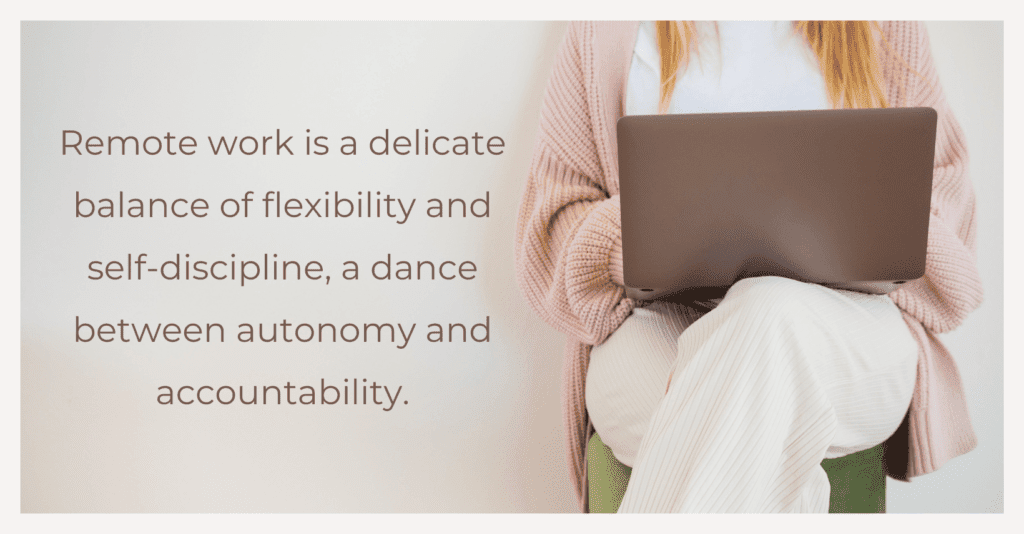
In a world where we’re always racing against time, trying to keep up with the hustle and bustle of life, being able to incorporate the much-coveted work-life balance has never been so crucial. Gone are the days when a household can have children and live on ‘just’ one salary, unless it’s an excellently paid job. Of course, even for those who are childless, the need to be able to juggle work-related duties with familial or personal ones still remains. And let’s not forget time to ourselves, which, let’s face it, is more often than not, overlooked.
This is precisely why everyone dreams of having a remote job, not only because of the flexibility it promises but also because it’s a fact that, for the most part, many jobs across different industries and verticals can afford this benefit. But, one begs to question: is everyone cut out for it? My simple and blunt answer is a resounding no.
No Doubt, COVID-19 Paved the Way
While we’re well over 3 years past the global pandemic era, it’s safe to say that one of the best ‘silver linings’ Covid-19 has brought with it was the increase and acceptance of working from home (WFH) or, the more commonly known ‘fully-remote’ jobs. Some companies try to offer an ‘in-between’ through hybrid work options, where some days you work on-site and others at home. Fortunately, employers have come to terms with and acknowledged the fact that there are many on-site jobs that can easily be done from home or abroad, depending on the nature of the work and the job’s exigencies, provided that duties are done in the same way as if one were at the office.
Some Personal Context
As a mother to a young child myself, I’d be lying if I said I don’t feel extremely lucky to have such a luxury, because let’s face it, that’s what it is. So before I go into the ins and outs of what I believe a remote job is all about, what it entails, and what people’s expectations should be, I’d like to make one thing clear: I acknowledge the fact that I’m privileged to be given such a perk. But, the truth is, it was a long journey and one which was riddled with quite a few bumps along the way. It wasn’t something that just fell into my lap.
It is for this very reason I want to debunk the myth that remote work is a cushy job where you can input half the effort of an on-site job. Would I change it for an office-based job at this point? Probably not. Flexibility and autonomy are two big pluses I cannot imagine giving up. But I also understand that such a benefit comes with a fair amount of responsibility, where an employee needs to be mature enough to still answer to a boss, produce results, be transparent and most importantly, hold themselves accountable. Otherwise, if such foundations aren’t established from the get-go, you’ve lost the plot. And, eventually, you can even lose your job.
Let’s Acknowledge the Advantages
Of course there are many advantages to working remotely. These are the main ones I can think of off the top of my head:
- It allows you to be economical – Aside from the monetary aspect of fuel costs, it also saves you time. Daily commutes to and from work won’t be a headache, especially during peak traffic hours, when everyone’s starting or finishing work.
- It’s far less stressful – The age-old adage of patience being a virtue needn’t come into play here. Apart from avoiding traffic jams, there’d be no need to pray to some deity for a good parking spot or arriving at work on time.
- You’re your own boss – Well, so to speak. You can prioritise tasks and complete them in order of urgency.
- There’s less micromanagement – Sure, some companies still have loopholes to ‘breathe down’ employees’ necks even if they’re away from the office. But, for the most part, you’re left to work autonomously.
- You can enjoy flexibility – This one’s a personal favourite. If you have urgent personal matters such as doctors’ appointments, school meetings or the like, you can make up for lost time later on in the day or on other weekdays/weekends.
- ‘You’ time during your day – Exercise, take a breather, grab a quick coffee. Obviously, do this sparingly and with the intention of making sure all tasks are seen to once you’ve arrived.
Remember, It’s Still a Job!
If someone were to ask me for sound advice before starting a fully remote job, I would certainly remind them to treat it like a regular 9-5. Thus, fulfilling the role’s duties goes without saying. Just like any other job, you need to ensure tasks are completed, goals are set, working the agreed number of hours is mandatory. Also, you still need to answer to superiors regarding the status of your work and what results you’ve generated.
Things to Keep In Mind
If I had to give a short list of tips to someone starting a WFH job, this is what I’d advise:
- Don’t ever take it for granted – Companies can easily implement changes and ask employees to go back to the office. Of course, if you’re still being interviewed, you can list this perk as a ‘non-negotiable’ term and ask to have this in writing.
- Be transparent – Don’t try to take advantage. Be honest if you’re not going to be by your desk; let your boss/colleagues know when you’ll be back to work and when you’ll be available.
- Hold yourself accountable – Be mature enough to know where you’ve failed, what you can improve and if you might need to be more productive.
- Be Self-disciplined – Time management is key here. It’s easy to waste time or do stuff around the house when you’re not in an office. Don’t overdo it, and set targets – no matter how big or small they may be. If needs be, go old school and compile a simple ‘to-do’ list.
- Be vigilant of scams – These are rampant, particularly on social media. So, if you see some post with cryptic wording where you can get paid unrealistic daily or weekly earnings, be sceptical. If the full job specs aren’t listed, you’re asked to send the original poster a private message for more details, and you’re asked to buy products to start off – steer clear. These are usually multi-level marketing schemes, so don’t get reeled in.
Learn how to ‘switch off’
Admittedly, this is something I sometimes struggle with myself. When working from home, it’s pretty tempting to log on ‘just’ to check an email or see whether there are any updates on a task you stopped midway. Ultimately, just like you need to be disciplined with investing the required time for your job, the same rule of thumb applies when being logged off. Unless the task is of high urgency, it can wait till the next day or until Monday.
And Finally, Enjoy the Perks…But Do So Responsibly!
When comparing and contrasting an on-site job to a fully-remote one, from my own experience, I would hands down prefer the latter. However, one also needs to be aware of what they’re getting themselves into. A WFH job should not be treated as an afterthought or a bunch of tasks to ‘squeeze into’ a day after you’ve sorted your own personal errands.
To quote Voltaire or (for the Marvel fans out there), Peter Parker’s Uncle Ben, ‘With great power comes great responsibility’. A pretty apt cautionary warning if there ever was one…even if the context is starkly different.

Hi there, I’m Michaela Mihailovic, a Content Manager with an affiliate marketing company. I’ve always had a passion for writing. To me it’s an art form and cathartic outlet where I’m able to put pen to paper my thoughts, opinions and everything in between. I consider myself quite opinionated on topics that matter – women’s health and rights being some of the subjects I hold dear to my heart. I’m the kind of person who doesn’t shy away from asserting her views, but I also believe in the art of a healthy and respectful debate.





